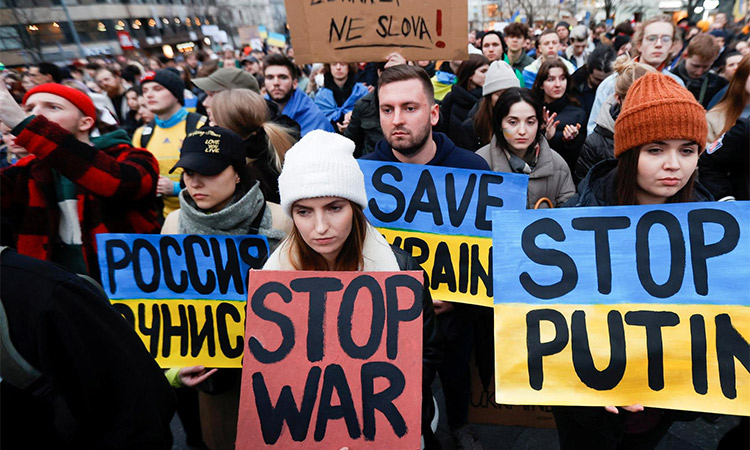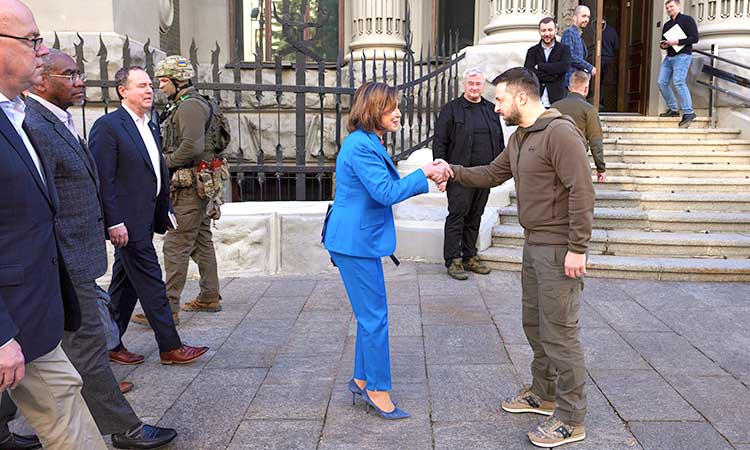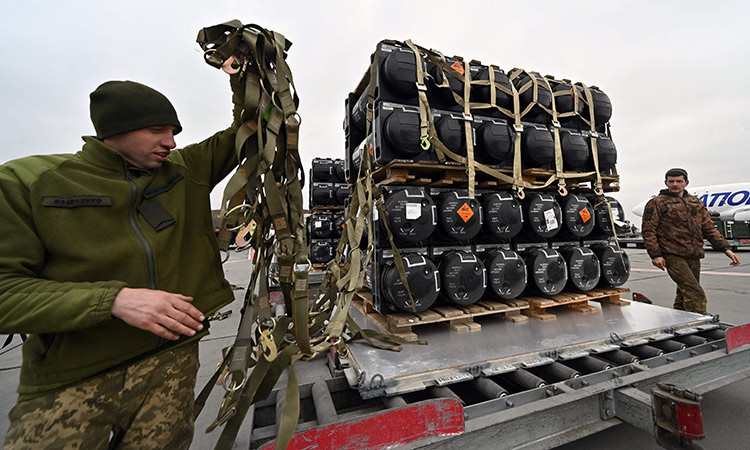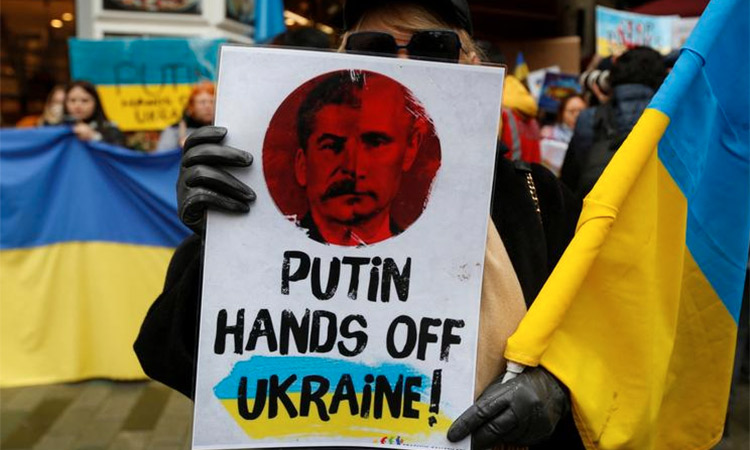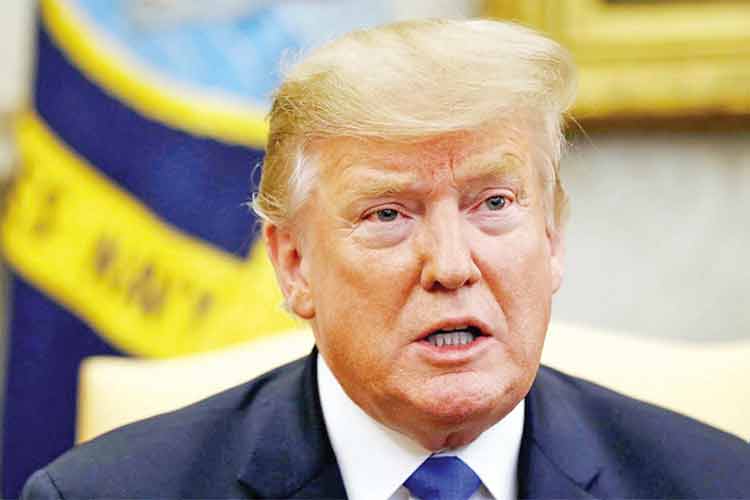Conflict is good for American business

Michael Jansen
The author, a well-respected observer of Middle East affairs, has three books on the Arab-Israeli conflict.

Volodymyr Zelensky and US Speaker of the House Nancy Pelosi shake hands during their meeting in Kyiv, Ukraine. AP
Eisenhower, a commander who had witnessed the waste of war, said that “we must learn how to compose differences not with arms, but with intellect and decent purpose.” His advice has never been heeded. Eisenhower’s successors have consecrated the relationship between the military and weapons manufacturers.
While the military budget is only 3.7 per cent of GDP, the US spends on weaponry more than China, India, Russia, United Kingdom, Saudi Arabia, Germany, France, Japan, South Korea, Italy, and Australia, combined.
The Biden administration’s current military budget is $782 billion, an increase of 5.6 per cent over $761 billion for 2021. According to the Stockholm International Peace Research Institute (SIPRI), military spending by the US, number one on the list, accounts for 30 per cent of total global expenditure. Number two, China accounts for less than half at 14 per cent; India, 3.6 per cent; the UK 3.2 per cent; and Russia, 3.1 per cent. The US is by far the largest arms exporter, followed by Russia, France, and Germany. Exports finance research and development and manufacture. In other words, weapons beget weapons.
Although he stirred up war fever over Ukraine, President Joe Biden never served in the military and received five draft deferments during the Vietnam war. Nevertheless, he has campaigned on his son Beau’s 2008 deployment to a combat zone in Iraq following the 2003 unprovoked US war of aggression and illegal occupation of that country. This past week, Biden asked Congress for $33 billion in funding for Ukraine.
The package contains more than $20 billion for weapons, ammunition, and other military material, $8.5 billion in economic assistance for the government, and $3 billion in humanitarian aid. It is significant that $11.4 billion of the sum for weapons is for replenishing stocks of arms manufacturers.
This huge sum is in addition to $14 billion Biden called for last month and the earlier $3.7 billion in arms aid initially provided to Ukraine.
This boosts the total to $47.7 billion. Writing in Responsible Statecraft, experts Ben Freeman and William Hartung point out that the sum is more than the administration has committed to fighting climate change.
They argue that among “the primary benefactors of this aid package will be Pentagon contractors, whose CEOs have explained how the Ukraine conflict is good for business and have seen their stock prices soar since the war began.”
Acording to Taylor Giorno of Open Secrets, the top five defence contractors spent more than $16 million on lobbying in the first quarter of 2022 alone, and their CEOs met directly with Pentagon leadership earlier this month to discuss Ukraine security assistance.”
Freeman and Hartung contend that US taxpayers will “have to foot the bill for this historic aid package,” including the “fraud, waste and abuse” that will, inevitably, accompany its use.
Biden is not selling or gifting the arms. They have come under the latest version of the “lend-lease” act adopted by Congress last week. This bill allowed Biden to lend or lease military materiel to Ukraine for fiscal year 2022-2023 and ensures that deliveries will be prompt and avoid bureaucratic delays and obstacles.
The original “lend-lease” legislation was adopted during the administration of Franklin D.Roosevelt in March 1941 to provide Britain, the Soviet Union, and other European countries with weapons, food and fuel to defend against the Nazis. At the time Roosevelt proposed the legislation the US claimed neutrality in the war against Nazism due to strong popular domestic opposition to US involvement in a second European conflict in less than half a century. The US entered the war after the Japanese attacked Pearl Harbour in December of that year but lend-lease carried on. Supplies worth $50.1 billion – equivalent to more than $700 billion now – were provided until the war ended in 1945.
While most was not paid for, some ships were returned to the US and during the war the US was leased land for military bases in allied countries.
This arrangement provided the US with footholds for the global military outreach developed over the decades and the Pentagon with funds to spend on arms from domestic military manufacturers. Biden’s bill would also empower the US Justice Department to seize Russian oligarchs’ properties and pass on cash realised from these expropriations to Ukraine as well as criminalise sanctions violations. US and NATO weaponry not only help Ukraine protect itself from Russia but also prolong a war which should have never been waged in the first place.
This is a war Ukraine cannot win because the country is suffering massive military and civil deaths and destruction of its cities, towns and villages, roads and railways and manufacturing infrastructure. This is also a totally unnecessary war.
If Ukraine had taken the advice of well-meaning experts — including the current head of the US Central Intelligence Agency Bill Burns — Kyiv would have refrained from challenging Moscow by insisting on joining NATO. While serving as US ambassador to Russia he warned against this stance, contending this was a “red line” for Russia. “Nyet means Nyet!” or “No means no!” He was not the only person to repeatedly warn of the risks of expanding NATO eastwards.
NATO itself should also have taken this into account and made it clear that Ukraine should follow the example of neutral Finland and Sweden and avoid disturbing the great bear that is Russia.
Moscow will also be a loser in the war, but its losses will be far less serious than those of Ukraine, the battleground country.
The major moral and political losers will be the Western powers which claim to uphold the “rule of law” and the UN Charter by supporting Ukraine in this proxy war against Russia while ignoring conflicts the US and other Western powers have had a hand in elsewhere, including Palestine, Syria, Iraq, Afghanistan, Libya, and South Sudan. Little wonder that many countries of the “global south” do not support the US/NATO proxy war in Ukraine.
